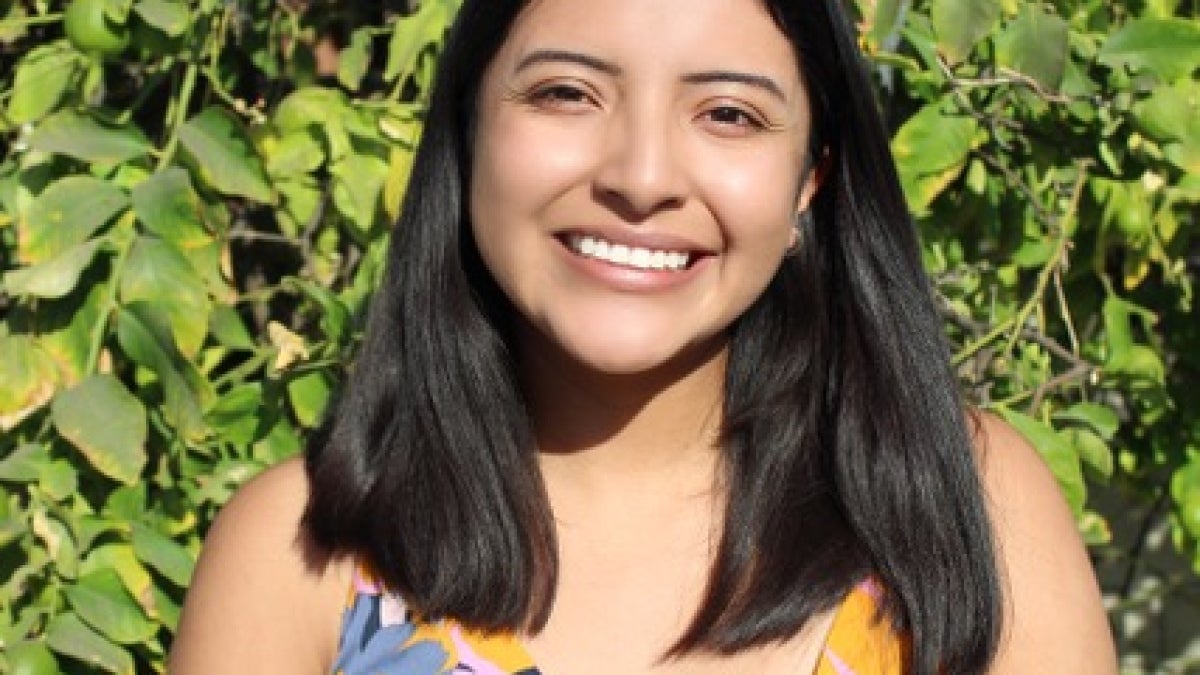Cronkite School convocation speaker vows to give back

Patricia Vicente has been tapped as the fall 2020 student speaker at the Walter Cronkite School of Journalism and Mass Communication convocation at 6 p.m. Dec. 14.
Editor's note: This story is part of a series of profiles of notable fall 2020 graduates.
Patricia Vicente, a first-generation college student, has no intention of forgetting where she came from. In fact, she is determined to remember and help others with similar backgrounds.
Vicente has thrived at the Walter Cronkite School of Journalism and Mass Communication, where she'll be getting her Bachelor of Arts in Sports Journalism with a minor in Spanish this December. She hopes to use her degree to pursue her interests in sports journalism or work in underserved communities abroad.
The Pomona, California, resident earned a New American University Scholarship to attend Arizona State University. She also was awarded the Bright Prospect Scholarship designed to help low-income, first-generation students pursue a college education.
Vicente, who will deliver Cronkite’s student convocation address next month, has taken full advantage of the opportunities at the Cronkite School. She interned for the United Soccer League Players Association and for Fox Sports Arizona. She worked for the Walter Cronkite Sports Network as well as the Phoenix and Los Angeles Cronkite sports bureaus. She was also a contributing writer for The Odyssey, a national online publication for college students.
We recently sat down with Vicente to discuss the most important lessons she has learned at ASU and get her advice for future students.
Question: What was your “aha!” moment when you realized you wanted to study journalism?
Answer: I was originally applying as a philosophy major, which is completely different than what I'm doing now. I don't know what I was thinking at the time. But my high school counselor sat me down, and she gave me an ASU pamphlet and she was like, “I know you like English, writing and journalism. I also know you like to talk about sports for fun. They have a major that combines both.”
Q: What’s something you learned at ASU — in the classroom or otherwise — that surprised you or changed your perspective?
A: You have to believe in yourself. As cheesy as it sounds, if you don't believe in yourself, no one else will. If you walk around with confidence like, “Hey, I might struggle through it, but I will get the job done,” then other people will trust you.
Q: Why did you choose ASU?
A: In high school I applied to a total of 25 schools and by Nov. 1, I had already applied to 24 of those schools. So I applied to ASU after my counselor told me about the sports journalism program, and then they were actually my first acceptance, so here I am. I couldn’t be happier with the way it turned out.
Q: Which professor taught you the most important lesson while at ASU?
A: I took a student production class with Allison Forbes, and I remember she had us do every single job in the production room. She said that all of us someday are going to need to know how to do everything, even if it’s not our specific job. And, if we can step up and fill in, it’s going to go a long way in gaining the bosses’ respect and trust, which is something you want if you want to be successful.
Q: What’s the best piece of advice you would give to those still in school?
A: Make sure that you're happy with what you're doing. Whether that's ASU or anywhere else, it has to be something that you want. It may take some trial and error, but as long as you're happy and you find something you truly enjoy — as cheesy as it sounds — you’ll never work a day in your life.
Q: What was your favorite spot on campus, whether for studying, meeting friends or just thinking about life?
A: I really miss the First Amendment Forum. It’s the perfect place to nap and also the perfect place to meet friends. It's sort of the living room of the Cronkite School.
Q: What are your plans for after graduation?
A: I really want to work in a Spanish-speaking country. That's something I've wanted to do since freshman year of high school. Bilingual communications is a passion of mine, so whether it’s borderlands coverage or something in sports, I’m just really hoping that I get that opportunity.
Q: If someone gave you $40 million to solve one problem on our planet, what would you tackle?
A: Definitely education in underserved communities. I came from a community like that, but I was lucky to have resources to pursue a college degree. I always tell younger students: “Don’t think that just because you're from a certain community or because your parents have no education that you can't pursue a degree. There are a lot of scholarships out there.”
Written by Franco LaTona
More Law, journalism and politics

How to watch an election
Every election night, adrenaline pumps through newsrooms across the country as journalists take the pulse of democracy. We…
Law experts, students gather to celebrate ASU Indian Legal Program
Although she's achieved much in Washington, D.C., Mikaela Bledsoe Downes’ education is bringing her closer to her intended…

ASU Law to honor Africa’s first elected female head of state with 2025 O’Connor Justice Prize
Nobel Peace Prize laureate Ellen Johnson Sirleaf, the first democratically elected female head of state in Africa, has been named…